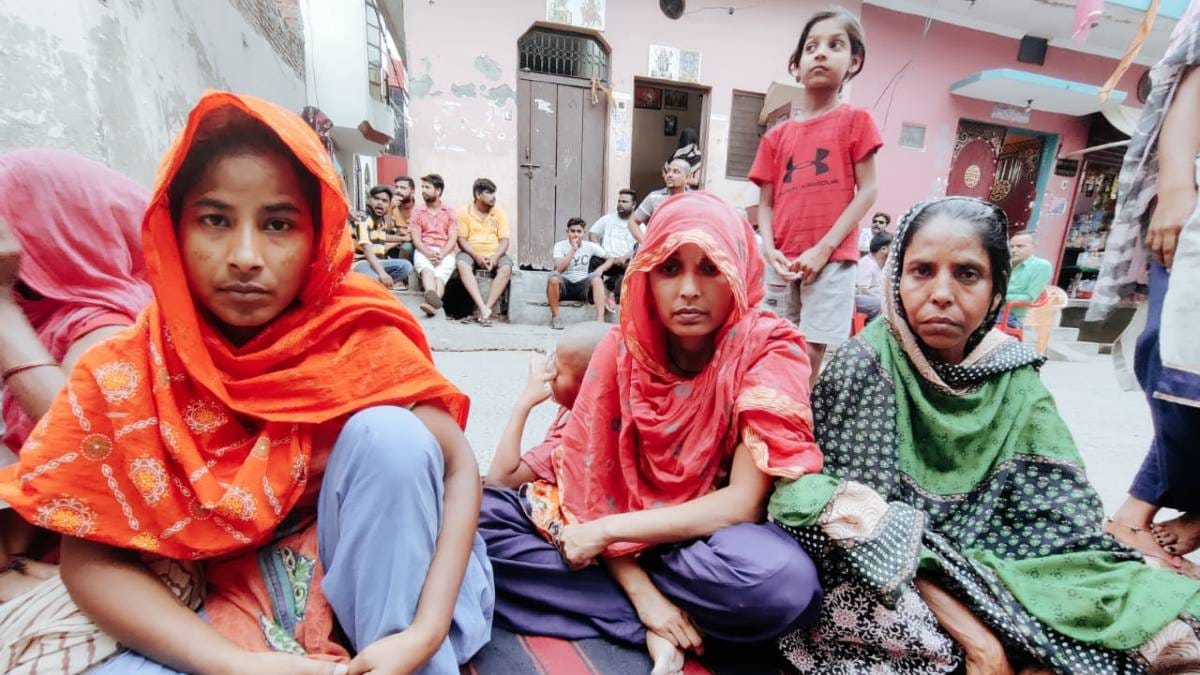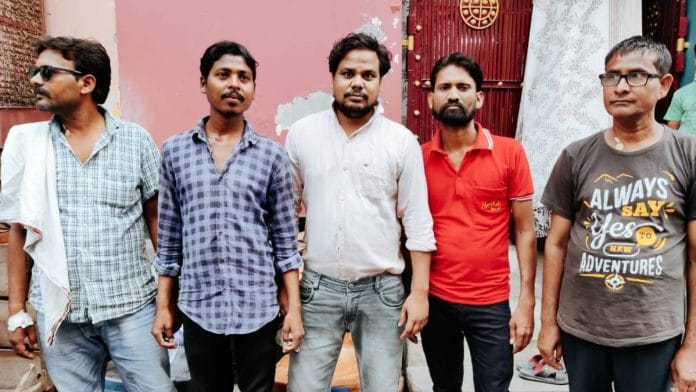Aligarh: It has been well over a week since 11 of this colony’s 350 residents were taken ill, but the Valmiki Basti in Chandaniya, Aligarh, is still haunted by the memories of the night of 29 May.
“One by one people started falling ill and were rushed to the hospital. Often, those accompanying the sick, also started puking on the way there. We had no idea what was happening. At first, we thought we had had a little too much to drink. But soon it was clear that all of us were suffering from poisoning,” said Kalicharan, one of the survivors.
Three of Chandaniya’s 11 died of the poisoning.
According to Chief Medical Officer (CMO), Aligarh, Dr Bhanu Pratap Singh Kalyani, at least 35 people have died in Aligarh city after consuming spurious alcohol between 28 May and 5 June. The police had sent 106 bodies, from across Aligarh district, for post-mortem. While in 35 cases, the cause of death was confirmed to be alcohol poisoning, for the remaining 71 though alcohol poisoning is suspected, the cause of death is yet to be confirmed.
Earlier, Senior Superintendent of Police, Aligarh, Kalanidhi Naithani, had refused to comment on the number of deaths and had, instead, told ThePrint to contact the CMO. “You will get all relevant data on the number of deaths from the Chief Medical Officer,” he had said.
Kalyani said they have “confirmed the death of only 35 from alcohol poisoning because when we opened their stomach, there was a strong smell of alcohol. But when we opened the bodies of the rest, there was no such smell. Viscera samples of all 106 bodies have been sent for examination and we are waiting for the reports”.
A viscera test is an examination of the internal organs of the body of the deceased. It is conducted in cases where a post-mortem has been inconclusive. The reports for these are still awaited and the CMO said he was unsure about when they will arrive.
Gaurav Dayal, Commissioner, Aligarh division, however, told ThePrint Wednesday that the while post-mortem examinations take time, “a long list of examinations have to happen, so we don’t have a clarity on the timeline” of when all the reports will be received.
“The current presumption is that all 106 deaths happened because of alcohol poisoning and we are working with the government to ensure all bereaved families are compensated,” he said.
The first deaths were reported on 28 May. This alerted the police and as searches began in various shops selling cheap, country liquor, police said cartons of liquor were dumped into the canal in the city. Many of the subsequent deaths from consumption happened after people found these bottles in the canal.
The brick kiln workers of Akrabad in Aligarh district are among those who picked up the discarded bottles in the canal. Five deaths were reported from here on 5 June.
The police have made 61 arrests and registered 17 FIRs in the case. The three main accused are Anil Chaudhary, Rishi Sharma and Bipin Yadav, who have been booked under Section 60 A of the UP Excise act and Section 272 (adulteration of food or drink), 273 (sale of noxious food or drink item), 304 (causing death by negligence), 420 (cheating), 467 (forgery) and 468 (forgery with intent to cheat) of the Indian Penal Code (IPC). All three have been arrested.
Uttar Pradesh Chief Minister Yogi Adityanath has announced a compensation of Rs 5 lakh for the families of victims.
A week after the tragedy first hit Aligarh, ThePrint visited two of the badly-hit areas — Chandaniya and Akrabad — on 5 June to meet survivors of the tragedy.
While family members of those who died in Chandaniya, told ThePrint that the compensation money wasn’t enough to ensure a stable future for them and what they wanted was jobs, in Akrabad, many were not even aware of the compensation announced by the state.
Also read: How we gave birth to hooch tragedies and why they will continue to grow
‘The poison was just sitting on the counters, waiting for us’
“Why have you come to ask about us now? You should have come here on 30 May, should have seen the bodies of three young men lined up here, while their wives broke their bangles at their feet,” burst out a resident, as he saw ThePrint team.
“What should we tell you about that day? They have little children. Can you or anyone understand their pain?” asked the resident, who didn’t wish to be named.
At Chandaniya, many residents had tiny bandages on their throats — an indication that they had had a dialysis recently. Eleven people were admitted in hospitals near the colony in the intervening night of 29-30 May. One person, Ravindra Singh, who works as a clerk in a bank, has completely lost vision in his right eye.
“Consumption of methyl alcohol, traces of which were found in the liquor consumed by these people, leads to rapid generation of formaldehyde in the body, which can cause temporary or permanent damage to the optic nerve, kidneys and liver. If given timely treatment, the organs would recover within three-four days. If not, they’ve sustained permanent damage,” Kalyani explained.
Since 29 May, when the residents of this colony started falling ill after consuming the spurious liquor, many politicians, administrators and activists, have visited to offer their condolences to the families. But people here do not want words.

“I don’t want assurances and I don’t want condolences. I just want the government to offer me employment, so that I can bring up my four little children and move on. I have nothing left,” said Seema Chauhan, who lost her husband Nitin, on 30 May.
Poonam, 25, said she has been left completely alone, since losing her 30-year-old husband, Chotu. “He was young, he could’ve pulled through, but doctors refused to lay a finger on him. I lost three-four hours just trying to get him admitted and he died. Will anyone be able to bring him back?”
The ones who survived now stand deep in debt. On an average, all of them had to spend Rs 60-70,000 on treatments. Most of them have blue-collared jobs, with an average salary of Rs 12-15,000 a month.
“Should the government not take responsibility that a poison was just sitting on the counters, waiting to be consumed? They should definitely reimburse our hospital bills. We’re poor, where do we go?” asked the father of a survivor, who didn’t wish to be named.
According to Kalicharan, he fell ill after consuming Good Evening — a government-approved brand — that he had had before. But, according to SSP Naithani, the accused were selling illicit and spurious liquor in fake packages of the brand.
The government compensation of Rs 5 lakh means little to most of the victims and their families. What they want are jobs. “Will my four children survive on Rs 5 lakh for the rest of their lives? I don’t want it. I just want an employment guarantee,” said Seema.
Also read: How much alcohol is fine for the brain? Oxford University study says no amount is ‘safe’
‘Awareness drive saved them’
Meanwhile, among the brick kiln workers of Akrabad where five people have died, families of victims, don’t even know of the compensation package. Pushed to the brink by the Covid lockdown that has stalled work in many places, all they care about is the reopening of the kilns.
“I don’t know anything about compensation. I just want to cremate my sister-in-law’s body (who died on 4 June) and go on with my life. Lockdown has really affected our work. We don’t even have enough to eat. Can you ask the government to ensure our bhatti (kiln) starts operating again?” asked a worker at Akrabad, who did not wish to be named.
The kiln workers here are often among the poorest, with earnings of hardly Rs 700-800 a week. They drink, they said, to kill the exhaustion from their work, and hooch instantly puts them to sleep.
The spurious liquor case has now left many of the workers’ children orphaned.

On 5 June, as the temperature in Aligarh touched 39 degrees, 20-year-old Sunny, stood bare feet on the burning sand, waiting for his father’s body to arrive after post-mortem.
His face was devoid of any expression. With the responsibility of seven younger siblings now on him, time to grieve was a luxury he didn’t have.
“Last year, I lost my mother in Gaya to some illness. She didn’t get timely medical help. Nobody cares about us poor people. I am not sure of any compensation. Or if the cause of my father’s death has been confirmed as alcohol poisoning or not,” he said.
The police found 280 quarter-bottles on the banks of the canal that flows near the Akrabad kiln. SHO Mishra says casualties would’ve been much higher if not for the administration.
“Teams set up by the DM and us policemen have been going village-to-village (since the first deaths from alcohol poisoning were reported on 28 May) telling people to not drink alcohol for at least two weeks because it contains poison. If not for this awareness drive, you would’ve found only dead bodies here today,” he told ThePrint on 5 June.
(Edited by Poulomi Banerjee)
Also read: Alcohol abuse can change male DNA for three months after stopping, says NIMHANS study






